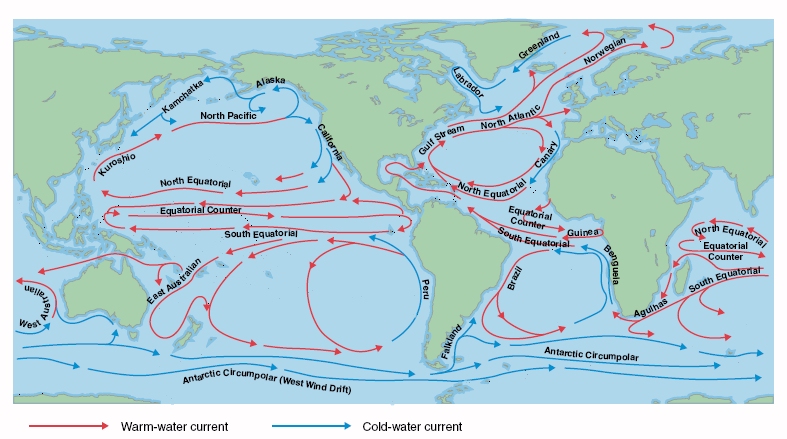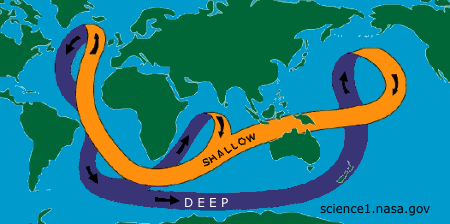Under Construction 
The oceans cover 141,600,000 square miles, or 71% of the earth's surface.
| Ocean | % of earth
surface | Average
Depth (ft) | Deepest depth (ft) |
| Pacific Ocean | 33% | 15,215 | Mariana Trench, 36,200 ft |
| Atlantic Ocean | 17% | 12,881 | Puerto Rico Trench, 28,231 ft |
| Indian Ocean | 14% | 13,002 | Java Trench, 25,344 ft |
| Southern Ocean | 4% | 15,000 | the southern end of the South Sandwich Trench, 23,736 ft (7,235 m) |
| Arctic Ocean | 3% | 3,953 | Eurasia Basin, 17,881 ft |
* Some books consider the Southern ocean (Antartic) as part of the Atlantic.

 The Thermohaline Circulation (THC) driven by the sun's heat absorbed by tropical oceans and impacted by variations in salt content in the water is a powerful force on the world's climate system.
A global "conveyor belt" set in motion when deep water forms in the North Atlantic. Cold temperatures and melting glaciers creating cold salt water which is heavier and sinks, moves south, and circulates around Antarctica, and then moves northward to the Indian, Pacific, and Atlantic basins. It can take a thousand years for water from the North Atlantic to find its way into the North Pacific.
The Thermohaline Circulation (THC) driven by the sun's heat absorbed by tropical oceans and impacted by variations in salt content in the water is a powerful force on the world's climate system.
A global "conveyor belt" set in motion when deep water forms in the North Atlantic. Cold temperatures and melting glaciers creating cold salt water which is heavier and sinks, moves south, and circulates around Antarctica, and then moves northward to the Indian, Pacific, and Atlantic basins. It can take a thousand years for water from the North Atlantic to find its way into the North Pacific.
See:
Climate Timeline Tool at NOAA.gov
Thermohaline Circulation at wikipedia
and oceanmotion.org- Warm surface currents invariably flow from the tropics to the higher latitudes, driven mainly by atmospheric winds, as well as the earth's rotation.
- Cold surface currents come from polar and temperate latitudes, and they tend to flow towards the equator. Like the warm surface currents, they are driven mainly by atmospheric forces.
- Gyres (A spiral oceanic surface current) form when the major ocean currents connect. Water flows in a circular pattern--clockwise in the Northern Hemisphere, and counterclockwise in the Southern Hemisphere.
See climate change effects on ocean currents.
Fish:
List of Fish Species -- Fish Photos at oceanLight.com
Seafood Watch at MontereyBbayAquarium.org
Ocean warming may be pushing fish species towards poles
Links:
National Oceanic and Atmospheric Administration (NOAA):
Ocean Service
Ocean and Costal Research
Oceanography at navy.mil
The Earths Oceans at reefnews.com
Earth's Oceans at EnchantedLearning.com
Oceanography at Wikipedia
Ocean Planet:Ocean Currents at NASA.gov
Ocean Currents at wisc.edu
last updated 29 June 2011
|
 Science
Science
 Earth
Earth
 Oceanography
Contact
Oceanography
Contact
 Science
Science
 Earth
Earth
 Oceanography
Contact
Oceanography
Contact
